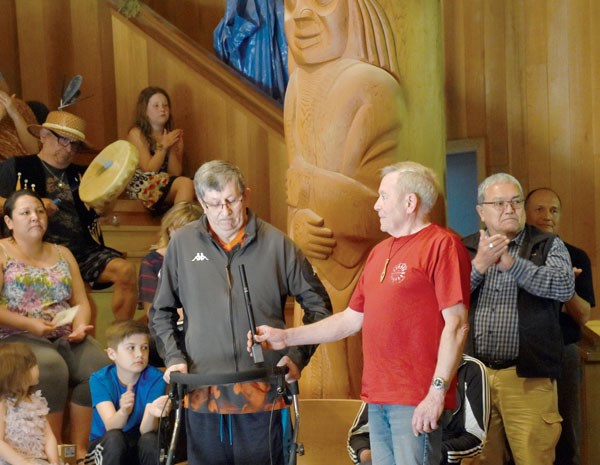Former shíshálh Nation chief Garry Feschuk, who is recovering from a stroke, sat under two totem poles inscribed with legends of his people at the shíshálh Longhouse. Next to him stood his project partner, Cam Reid, a former Sechelt mayor and RCMP staff sergeant. The unlikely pair is spearheading what they call Syiyaya Reconciliation Movement, and on April 25, more than 200 people joined them at the longhouse to launch it.
Feschuk dedicated the evening “to the people who aren’t here to see it, and can’t share their story.”
Reid emphasized the movement’s grassroots origins. “It’s a fantastic opportunity, the [local] governments are behind us, but we need money,” said Reid. The pair plans to involve members of shíshálh Nation and non-Indigenous Sunshine Coast residents in carving a Reconciliation Totem Pole and weaving Reconciliation Blankets.
It’s not rare that public events take place at the longhouse, but it doesn’t happen as often as it used to, Feschuk told Coast Reporter. He said he also wants more opportunities to bring non-Indigenous residents into the longhouse. “As part of this movement we’re hoping to do some cultural awareness workshops,” he said.
The evening began with a blessing and the calling of witnesses, followed by a feast of salmon, salads, desserts and coffee. After Feschuk and Reid introduced the movement, members of the Tl’ikw’am Dance Group performed under the guidance of Andy Johnson, cultural ambassador for shíshálh Nation and language teacher. Later in the evening, audience members were encouraged to participate in dances mimicking húpit (deer), s-chálilhten (salmon) and other animals.
The evening was punctuated by the accounts of elders and shíshálh community members, who spoke about what reconciliation means, as well as the experiences they endured as students of residential school, and the after-effects they have worked to overcome.
In 2012, a class action lawsuit was launched by the shíshálh Nation and Kamloops (tk’emlúps) Nation to seek compensation for residential students and their descendants, as well as bands that housed residential schools in or near their communities. The lawsuit is intended for those left out of the Indian Residential Schools Settlement Agreement, the largest class action settlement in Canadian history, because they or their descendants did not board at the schools but instead attended as day scholars. At the event, Feschuk spoke about the settlement, telling Coast Reporter afterwards, “It’s ongoing and we’re hoping to reach settlement soon.”
Representatives from local government were also in attendance. Sechelt Mayor Bruce Milne spoke near the end of the event. “It’s the truth we can’t change that makes reconciliation so difficult,” said Milne. “Reconciliation is about those truths that cannot be changed and won’t be changed, but we have to bring together.”
The organizing committee, which includes Randy Joe, Valerie Bourne, John Denham, Nancy Denham, Dale Sankey, Richard Till, Glen Martin, Siobhan Smith and Steven Feschuk, are collaborating on fundraising. They are selling T-shirts and asking for donations. They have also sought the support of local governments and plans are in the works to apply for grants. “These are just some of the ideas we have but we haven’t worked out those details yet,” said Feschuk.



